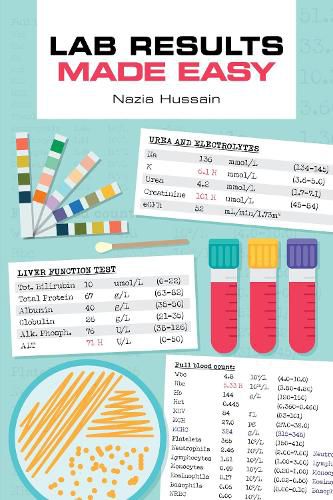Readings Newsletter
Become a Readings Member to make your shopping experience even easier.
Sign in or sign up for free!
You’re not far away from qualifying for FREE standard shipping within Australia
You’ve qualified for FREE standard shipping within Australia
The cart is loading…






It's 16.10 on a Friday afternoon on a busy on-call day: you have just managed to find the time to review and action your lab results:
37 results in the inbox... here we go...
Is this serious? Does the patient need admission to hospital today? It's just out of the reference range - shall I consider that normal and tick as 'no action required'? Should I just repeat the test, but what testing interval is appropriate? Are there other tests to request that may help in the diagnosis and management?
To answer these questions, and many more, the book is split into two main sections:
Clinical chapters covering clinical biochemistry, haematology, immunology and rheumatology, and microbiology, which review:
Managing individual abnormal test results
Background information Causes History and examination Investigations: initial and further tests to consider Referral GP management tips
The role of specific tests
Indications for use Interpretation tips
Investigations to consider for specific clinical scenarios and common signs and symptoms presenting to primary care:
Initial tests to perform Further tests to consider
Lab Results Made Easy is essential reading for everyone looking to safely manage abnormal results in primary care - it will help with decision-making, especially at 16.10 (and later) on those Friday afternoons...
$9.00 standard shipping within Australia
FREE standard shipping within Australia for orders over $100.00
Express & International shipping calculated at checkout
It's 16.10 on a Friday afternoon on a busy on-call day: you have just managed to find the time to review and action your lab results:
37 results in the inbox... here we go...
Is this serious? Does the patient need admission to hospital today? It's just out of the reference range - shall I consider that normal and tick as 'no action required'? Should I just repeat the test, but what testing interval is appropriate? Are there other tests to request that may help in the diagnosis and management?
To answer these questions, and many more, the book is split into two main sections:
Clinical chapters covering clinical biochemistry, haematology, immunology and rheumatology, and microbiology, which review:
Managing individual abnormal test results
Background information Causes History and examination Investigations: initial and further tests to consider Referral GP management tips
The role of specific tests
Indications for use Interpretation tips
Investigations to consider for specific clinical scenarios and common signs and symptoms presenting to primary care:
Initial tests to perform Further tests to consider
Lab Results Made Easy is essential reading for everyone looking to safely manage abnormal results in primary care - it will help with decision-making, especially at 16.10 (and later) on those Friday afternoons...